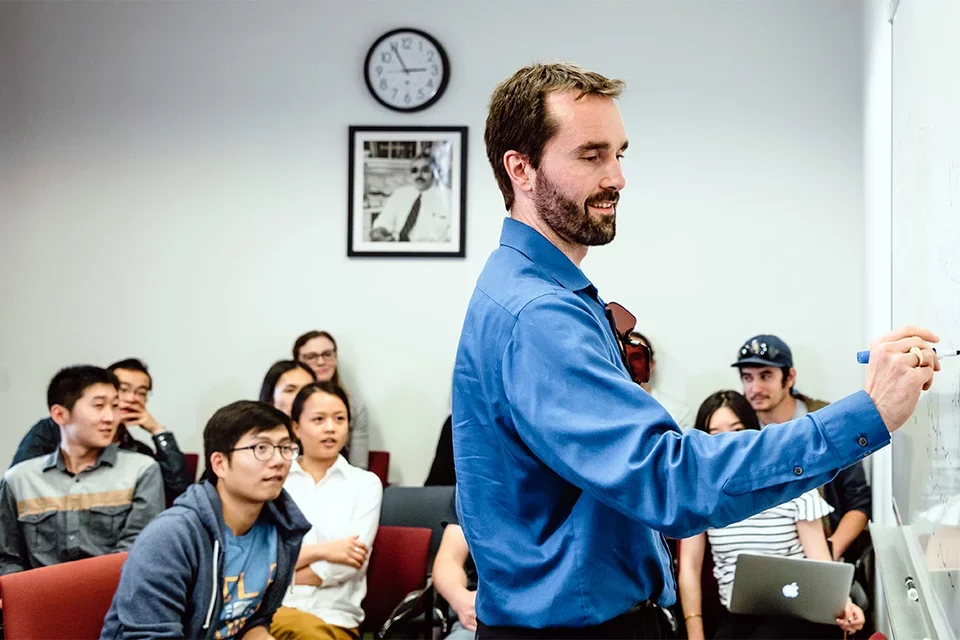MII Courses
Core curriculum classes taught by MII faculty

Contemporary training for biomedical informatics and data science
We offer a number of biomedical informatics and data science courses through MII’s training programs and initiatives. Classes are given annually and cover foundational concepts to provide students with an overview of the field and current methods.
| Course | Quarter | Instructor | Title and Description |
|---|---|---|---|
| BE 220 | Fall | Alex Bui, PhD | Introduction to Medical & Imaging Informatics. Weekly seminar providing new students exposure to current topics and research in biomedical informatics. Talks on ongoing research are given by faculty engaged in biomedical informatics and data science research from across UCLA. |
| BE M227 | Fall | Alex Bui, PhD | Medical Information Infrastructures & Internet Technologies. Introductory course on networking, communications, and information infrastructures in the healthcare environment. Students are exposed to basic concepts related to networking at several levels: low-level implementation (e.g., services), medium-level (network topologies), and high-level (distributed/cloud computing, web-based services, etc.). Topics cover common medical data protocols and standards/formats (e.g., HL7, DICOM); developments and issues in electronic health records (EHRs) and other types of clinical/biomedical repositories; and new trends in informatics related to computational infrastructure (e.g., mHealth). |
| BE M228 | Winter | William Hsu, PhD | Medical Decision Making. The objective of this course is to understand the statistical fundamentals related to medical decision making, with emphasis on modeling the process using informatics principles and machine learning approaches. The course covers concepts relating to the process of differential diagnosis; a review of basic concepts related to study design, statistics and probability theory;and modeling techniques. Course materials will be in taught in the context of how healthcare decision making processes are conducted. |
| BE 224A | Winter | Ricky Taira, PhD | Imaging for Medical Informatics. This course covers various aspects of medical imaging physics and informatics. Topics include image signal generation, signal localization, cognitive perception of presented imaging features, noise models, and multiscale interpretations of medical images. Informatics issues emphasize mappings between low-level physical generation phenomena (e.g., nuclear, atomic) to higher-scale environments (e.g., molecular lattices, micro-physiology, and tissue characteristics), looking at generative physical and biological processes that affect image appearance. |
| BE M226 | Spring | Ricky Taira, PhD | Medical Knowledge Representation. This course covers issues related to knowledge representation from the perspective of medical and imaging informatics. It covers topics related to context free and context sensitive declarative knowledge; probabilistic representations dealing with sequences and cause and effect chains; and methods for free-text document analysis. Lectures on how to represent a clinical observation as well as how to represent an experimental clinical trial are given. All examples are drawn from the medical domain. |
| BE 224B | Spring | Corey Arnold, PhD and William Speier, PhD | Advances in Medical & Imaging Informatics. This course provides an overview of informatics-based applications of medical imaging with focus on various advances in the field, such as content-based image retrieval, computer-aided detection/diagnosis, and imaging genomics. It includes an introduction to core concepts in information retrieval (IR), reviewing seminal papers on evaluating IR systems and their use in medicine (e.g., teaching files, case-based retrieval, etc.), as well as an examination of specific techniques for image feature extraction and processing, feature representation, indexing and querying, and classification (machine/deep learning). Lectures include a survey of clinical applications of these techniques and discuss ongoing challenges in the field. |
| BE 223A-B | Fall/Winter | William Speier, PhD | Programming Lab Rotation. This lab provides students an opportunity to appreciate interdisciplinary team science, working together on a project defined by an MII faculty member. Projects change each quarter, providing insight into software development/engineering; evaluation; and other aspects of translational informatics and data science. |